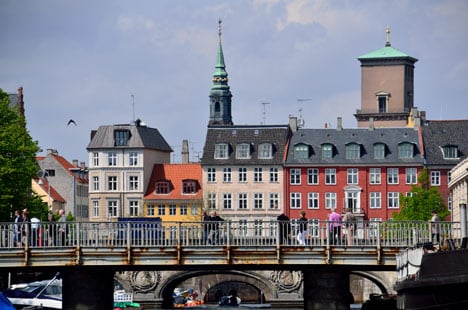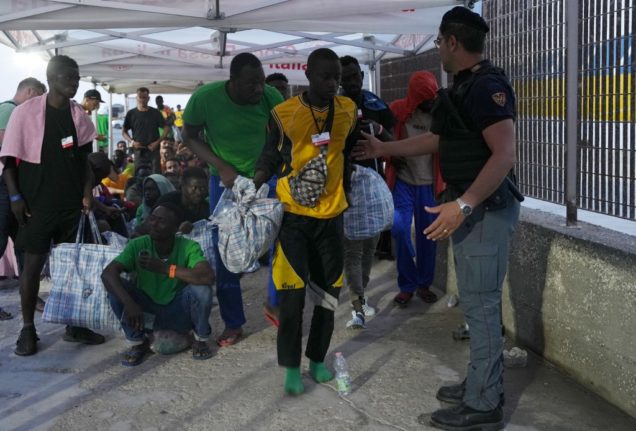 Uffe Elbæk is a member of parliament and the political spokesperson for Alternativet. This op-ed was originally published in Politiken and has been translated and republished with the author's approval.
Uffe Elbæk is a member of parliament and the political spokesperson for Alternativet. This op-ed was originally published in Politiken and has been translated and republished with the author's approval.IMMIGRATION
‘I’m sick and tired of the immigration debate’: MP
Former culture minister Uffe Elbæk has had enough of the 'us versus them' mentality that has defined the Danish immigration debate for years. We should instead be talking about what it means to be a part of a modern and diverse Denmark, the MP argues in this op-ed.
Published: 8 July 2014 14:16 CEST

It's time to accept that there is more than one Danish identity, Uffe Elbæk argues. Photo: Colourbox
I recently returned from Almedalen in Visby. Just like at Bornholm’s Folkemøde, there were political parties, grassroots organisations and interest groups in every shape and form.
The official programme contained nearly 3,000 political events and the turnout once again set a record. The Swedes are heading to the polls this year, so there was a lot to discuss.
One would like to think that the upcoming election was what warranted headlines in the Swedish papers during Almedalen. But unfortunately the attention was stolen by the ultra anti-immigrant Party of the Swedes (Svenskarnas Parti), who held a speech at one of the town squares.
The neo-Nazi party’s main message was that all of Sweden’s problems have one single cause: immigrants. They are the ones who take our jobs. They are the ones who cause the crime. They are to blame for the sky-high social welfare costs. And so on. The rhetoric was as predictable as it was manipulative.
In response, the churches of Gotland rang their bells during the party’s speech.
The message of the bells was one of compassion and diversity, a message that we should remember to look away from the darkness and towards the light. Touching. Moving. Beautiful. And it made me think about how sick and tired I am of the ‘immigrant debate’ in Denmark.
How about changing gear and focus? How about, instead of taking another ride on the us-versus-them carousel, we begin to discuss what it means to be a resident of Denmark.
Together across political and cultural boundaries, we need to ambitiously examine what it takes to create a new and sustainable ‘us’. An us that can and should include everyone, whether we eat meatballs, kebab or kale.
It will naturally require a set of common social and cultural rules. Particularly in the public arena. We need to make sure that the young Muslim girl doesn’t get her scarf ripped off or that the young girl in a short skirt doesn’t get called a whore. I accept neither the one nor the other.
But I also don’t buy the suggestion that one ethnic or religious group in Denmark is the cause of all of our problems.
I saw that argument when the Party of the Swedes gave their speech and we saw it recently at home with the inflamed debate that greeted the opening of Copenhagen’s new mosque.
We also see it when all Poles are suddenly characterised as being here to steal all of our jobs. There it is again: us versus them.
It’s as if we as a nation just simply have a hard time dealing with ‘others’. Even 40 years after joining the EU, our ‘yes’ to the union is still lukewarm. But we don’t want out of the European community either. We stand there hopping from one foot to the other. Yes, and no.
The same can bee seen when the discussion turns to whether Denmark is or is not a culturally diverse country. Well, just take a look around. We are a culturally diverse society.
There are many Danish identities. Not just one. That is a recognition we need to embrace. Meanwhile, we also need to fight against the concept of ‘the enemy’, dogmatism and cheap opinions. Regardless of who is behind them or where they come from.
That’s my approach to solving the challenges that come with being a culturally diverse, multicoloured society. We as a society should have the courage to look concrete social and cultural problems directly in the eye. Otherwise we will never be able to create a sustainable ‘us’.
In this process, there must be no issue that is off limits and no position of power – be it social, economic, cultural or religious – that is too sacred.
But just as it is important to look our problems directly in the eye, it is equally vital that we have the courage to look each other in the eye.
Surprisingly enough, it is often the latter that requires the most courage. The courage to see the world from another’s point of view. To feel the other – even when the other has completely different values than yourself. If each and every one of us can summon that courage, we’ll be able to figure it out.
Our future is common, whether we like it or not.
 Uffe Elbæk is a member of parliament and the political spokesperson for Alternativet. This op-ed was originally published in Politiken and has been translated and republished with the author's approval.
Uffe Elbæk is a member of parliament and the political spokesperson for Alternativet. This op-ed was originally published in Politiken and has been translated and republished with the author's approval.
Url copied to clipboard!


 Please whitelist us to continue reading.
Please whitelist us to continue reading.
Member comments